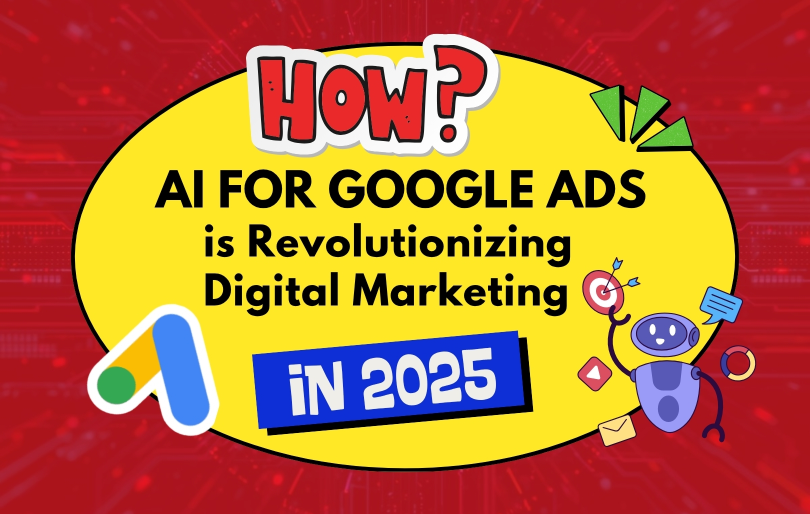How AI for Google Ads is Revolutionizing Digital Marketing in 2025
In 2025, the landscape of digital marketing is undergoing a seismic shift, driven by the remarkable capabilities of AI in Google Ads. As businesses strive to capture the attention of consumers in an increasingly crowded online space, artificial intelligence emerges as a game-changer, optimizing ad campaigns with unprecedented precision. Gone are the days of guesswork; AI analyzes vast datasets to predict user behavior and tailor campaigns that resonate deeply with target audiences. Partner with experts in pay-per-click (PPC) services to leverage AI-driven ad strategies that maximize your Google Ads ROI in 2025. This revolution isn’t just about enhancing efficiency—it’s about empowering marketers to deliver hyper-personalized experiences that engage users at every stage of their journey. Join us as we explore how AI for Google Ads is transforming strategies, boosting ROI, and setting new standards in digital marketing excellence. Embrace the future; the revolution is just beginning.
The Evolution of Google Ads and AI Integration
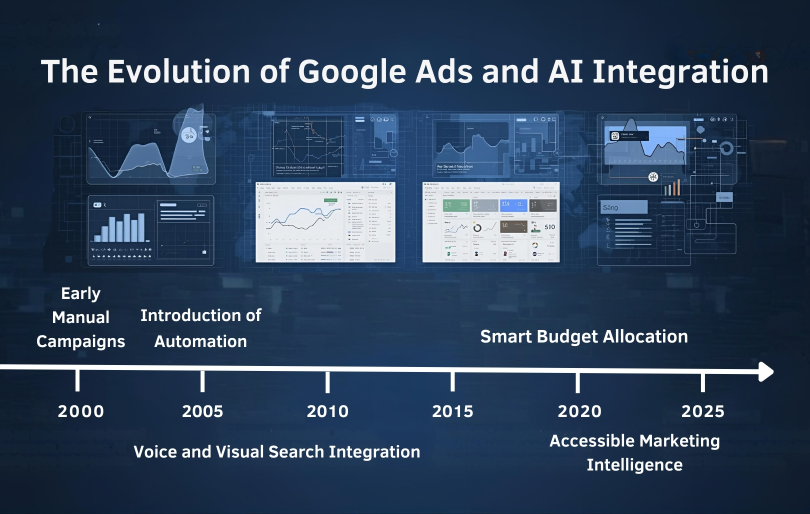
The journey of Google Ads from manual management to AI-driven automation marks a major turning point in digital marketing. Explore how Google Ads automation for business growth has reshaped digital marketing strategies for smarter results. What began as a platform requiring constant human oversight has evolved into an intelligent ecosystem powered by machine learning, predictive analytics, and automation.
Key milestones in the evolution of Google Ads and AI integration include:
- Early Manual Campaigns: Marketers relied on trial and error for keyword selection and bidding.
- Introduction of Automation: Automated bidding and keyword suggestions simplified campaign management.
- Machine Learning Advancements: AI began predicting trends and optimizing campaigns with real-time insights.
- Enhanced Personalization: Ads became more relevant through user data analysis and behavior tracking.
- Predictive Targeting: Algorithms started forecasting audience intent to deliver more impactful ad placements.
- Voice and Visual Search Integration: AI adapted to emerging search behaviors and devices.
- Performance Max Campaigns: Unified ad optimization across Google’s channels using real-time machine learning.
- Smart Budget Allocation: AI-optimized ad spend dynamically for higher ROI.
- Cross-Platform Insights: Integration of AI allowed unified reporting across devices and user journeys.
- Accessible Marketing Intelligence: Small and medium businesses gained access to enterprise-level optimization tools.
The fusion of Google Ads and AI continues to redefine the marketing landscape — making campaigns smarter, faster, and more effective than ever. Businesses that embrace this evolution position themselves for sustained success in an increasingly competitive digital world.
Key Benefits of Using AI for Google Ads
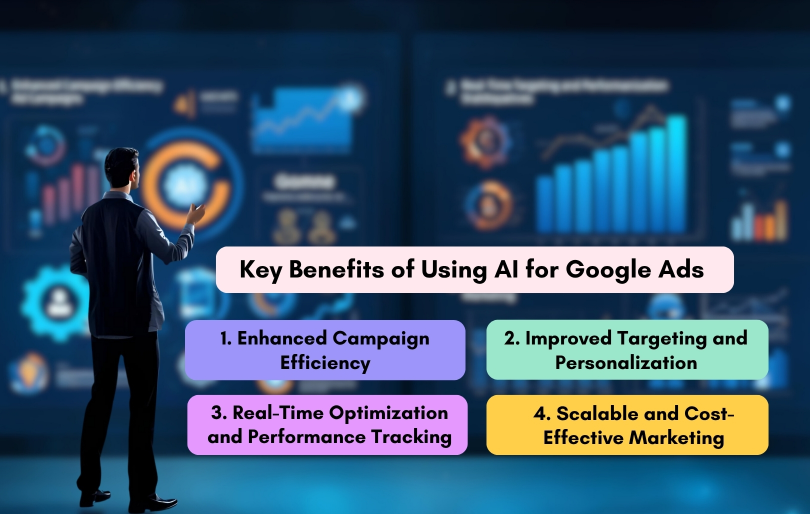
Artificial Intelligence (AI) is transforming how marketers manage, optimize, and scale their Google Ads campaigns. Learn how AI in digital marketing in 2025 enhances efficiency and drives better campaign outcomes. From automating data-driven decisions to delivering personalized user experiences, AI helps businesses achieve better results while saving time and maximizing ROI.
1. Enhanced Campaign Efficiency
AI streamlines campaign management by automating time-consuming tasks like bid adjustments, keyword optimization, and ad performance analysis. This automation enables marketers to focus on creative strategy while ensuring that campaigns remain data-driven, responsive, and optimized in real time.
2. Improved Targeting and Personalization
AI-powered algorithms analyze user data, behavior, and intent to create highly personalized ad experiences. This precision targeting ensures that ads reach the right audience at the right moment, increasing engagement, click-through rates, and ultimately, conversion rates.
3. Real-Time Optimization and Performance Tracking
With AI, marketers can monitor campaigns continuously and make real-time adjustments for maximum efficiency. The technology evaluates which ads perform best, reallocates budgets automatically, and refines targeting parameters — ensuring every dollar spent delivers measurable value.
4. Scalable and Cost-Effective Marketing
AI simplifies scaling campaigns across diverse markets and audience segments without losing performance quality. By automating budget distribution and performance insights, businesses can expand their reach efficiently, reduce wasted spend, and achieve consistent growth with minimal manual effort.
How AI Enhances Targeting and Personalization
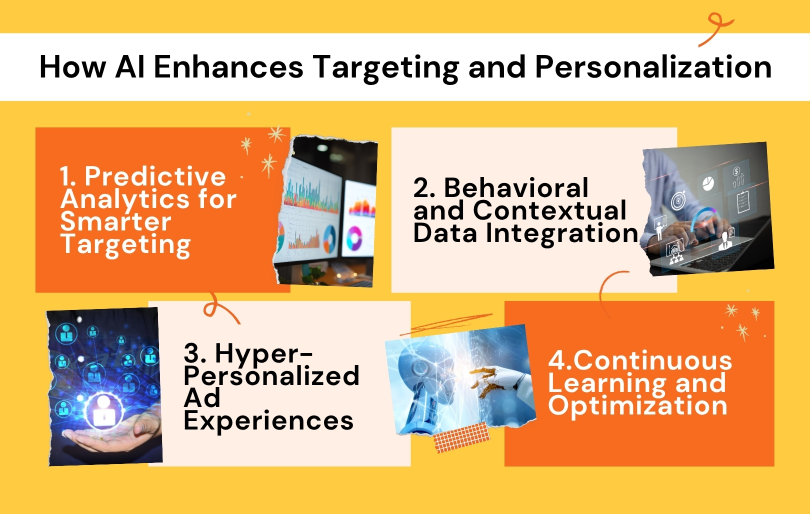
In today’s competitive digital landscape, Artificial Intelligence (AI) has revolutionized the way marketers approach audience targeting and ad personalization. Discover insights on personalization in email marketing campaigns powered by AI. By leveraging data-driven insights and machine learning, AI helps businesses deliver more relevant, timely, and impactful ad experiences that drive real results.
1. Predictive Analytics for Smarter Targeting
AI uses predictive analytics to forecast audience behavior and intent, allowing marketers to anticipate what users are most likely to do next. Learn how AI tools for marketers are transforming ad performance optimization. By analyzing patterns in user interactions, AI identifies high-value prospects—helping brands allocate their ad spend more strategically and maximize ROI.
2. Behavioral and Contextual Data Integration
Beyond basic demographics, AI combines behavioral signals—like browsing activity, past purchases, and device usage—with real-time contextual data. This deep understanding ensures ads reach users when they’re most receptive, increasing engagement rates and boosting overall campaign performance.
3. Hyper-Personalized Ad Experiences
AI enables brands to craft tailored ad experiences that speak directly to individual preferences. From customized product recommendations to dynamic ad messaging, AI ensures every interaction feels personal and relevant—driving stronger emotional connections and higher conversion rates.
4. Continuous Learning and Optimization
Unlike traditional targeting methods, AI systems continuously learn from new data to refine their targeting precision. This adaptive approach means campaigns automatically evolve with user behavior trends, ensuring sustained accuracy, performance, and audience relevance over time.
The Role of Machine Learning in Ad Performance Optimization
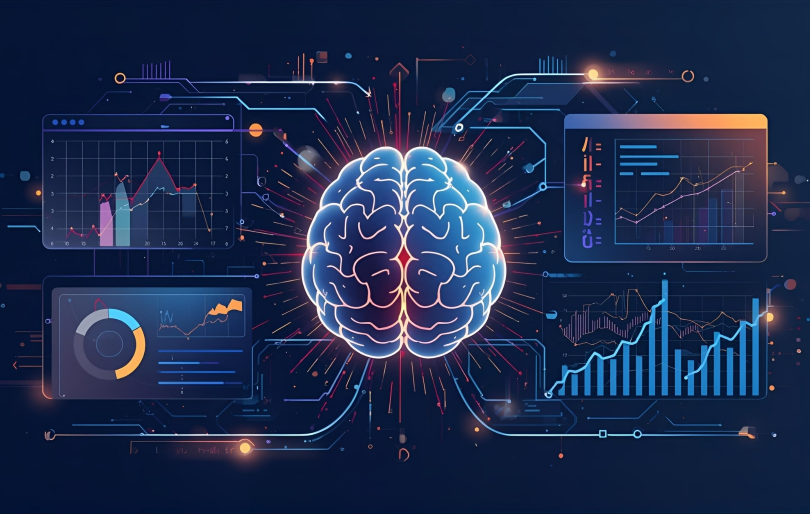
Machine learning is the driving force behind AI-powered Google Ads, enabling smarter, faster, and more efficient campaign optimization. By analyzing massive datasets, machine learning algorithms uncover patterns, predict outcomes, and automatically adjust ad strategies in real-time—ensuring each campaign delivers maximum impact and return on investment (ROI).
Here’s how machine learning enhances ad performance optimization:
- Automated Bidding Strategies:
Machine learning eliminates the guesswork from bid management. It automatically adjusts bids based on real-time performance data and user intent, optimizing for clicks, conversions, or impressions. This ensures your ads reach the right audience at the most opportune moment—without overspending. - Creative Optimization for Higher Engagement:
Through continuous A/B testing and data analysis, AI determines which headlines, visuals, and CTAs perform best. Machine learning then refines ad creatives dynamically, producing high-performing variations that drive engagement and conversions while reducing manual effort. - Intelligent Audience Segmentation:
AI-powered algorithms analyze user behavior, purchase history, and preferences to identify unique audience segments. This data-driven segmentation enables marketers to deliver hyper-targeted campaigns, ensuring each ad resonates deeply with the right audience group. - Dynamic Remarketing for Better Conversions:
Machine learning helps brands re-engage users by displaying personalized ads based on previous interactions. By showing the right product or service at the right time, AI-driven remarketing boosts conversion rates and strengthens brand recall.
In short, machine learning transforms ad performance optimization from a manual process into an intelligent, adaptive system—driving continuous improvement, higher engagement, and superior marketing results.
Challenges and Limitations of AI in Google Ads
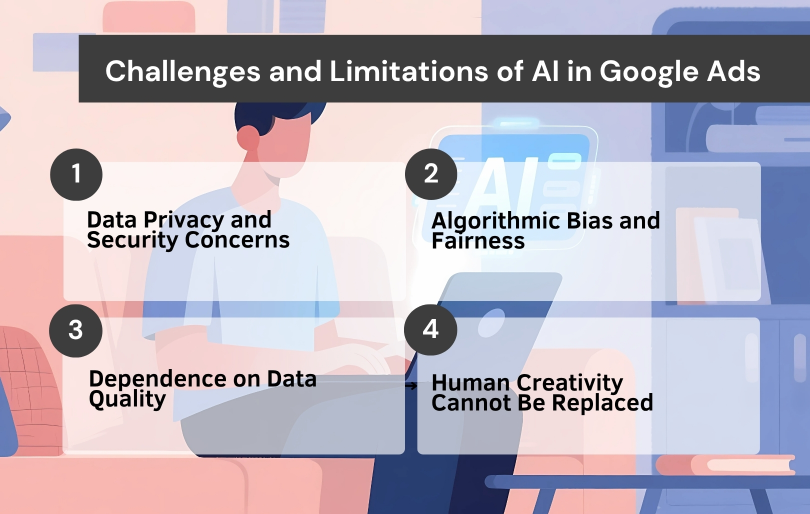
AI has transformed Google Ads by automating campaigns and improving targeting, yet it comes with notable challenges. Marketers must understand its limitations, including data privacy concerns, potential algorithmic bias, and the need for human creativity to ensure effective, ethical campaigns.
Data Privacy and Security Concerns
AI relies on vast amounts of user data to optimize campaigns. This raises concerns about data breaches, misuse, and compliance with privacy regulations. Businesses must handle personal information responsibly to maintain trust, avoid legal issues, and ensure campaign integrity.
Algorithmic Bias and Fairness
AI systems reflect the data they are trained on. If that data contains biases, campaigns may unintentionally target or exclude certain groups. Regular auditing and refining of AI models is essential to ensure fair, inclusive, and effective ad delivery.
Dependence on Data Quality
AI’s effectiveness is limited by the quality and completeness of available data. Inaccurate, incomplete, or outdated data can lead to poor decision-making, misdirected campaigns, and wasted budget. Continuous data monitoring and cleaning are critical for optimal AI performance.
Human Creativity Cannot Be Replaced
While AI automates optimization, it cannot replace human intuition, storytelling, or brand strategy. Marketers must continue crafting compelling messages, visuals, and campaigns. AI should enhance creativity, not replace the human touch in shaping engaging ad experiences.
Conclusion: The Future of Digital Marketing with AI
The future of digital marketing is undeniably intertwined with the advancements in AI technology. As we move forward, AI will continue to revolutionize the way businesses approach Google Ads and digital marketing as a whole. By leveraging AI, marketers can create highly targeted and personalized campaigns that resonate with their audience, driving engagement and conversions.
However, it is important to recognize that AI is not a magic solution. Successful digital marketing requires a balance between data-driven insights and human creativity. By combining the strengths of AI with the expertise of human marketers, businesses can achieve remarkable results and stay ahead of the competition.
As the AI revolution in Google Ads continues to unfold, it is essential for businesses to stay informed and adapt to the evolving landscape. Embrace the power of AI, invest in high-quality data, and foster collaboration between AI and human marketers. By doing so, you can unlock new opportunities, boost your ROI, and set new standards in digital marketing excellence. The future of digital marketing with AI is bright, and the revolution is just beginning.
